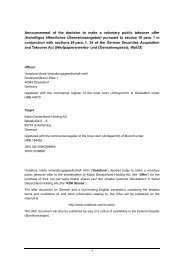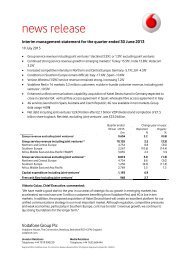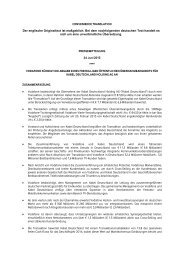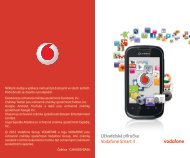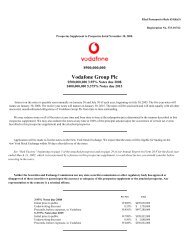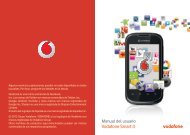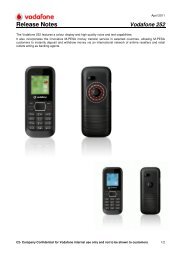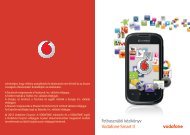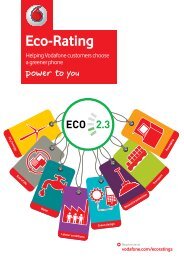Sustainability Report - Vodafone
Sustainability Report - Vodafone
Sustainability Report - Vodafone
You also want an ePaper? Increase the reach of your titles
YUMPU automatically turns print PDFs into web optimized ePapers that Google loves.
Our strategy Our performance in 2010/11<br />
Eco-efficiency<br />
Minimising our carbon footprint<br />
Objective Our performance in 2010/11<br />
Reduce CO emissions by 50% against the<br />
2<br />
2006/07 baseline by March 2020 for mature<br />
markets1 Trial a new carbon offset programme<br />
by March 2011<br />
Set a new CO intensity target for emerging<br />
2<br />
markets2 during 2010/11<br />
Develop joint CO reduction strategies<br />
2<br />
with suppliers accounting for 50% of<br />
procurement spend by March 2012<br />
Our total net carbon footprint across the Group increased by 63% in<br />
2010/11 to 1.96 million tonnes CO This rise reflects the inclusion<br />
2.<br />
for the first time of emissions data from Ghana, <strong>Vodafone</strong> Essar in<br />
India, Qatar and South Africa. Excluding these markets, like for like<br />
emissions have remained approximately level with an increase of<br />
1% from 2009/10.<br />
In emerging markets, our net carbon footprint has increased by<br />
four times in 2010/11 compared to 2009/10, as we continued<br />
to expand our network and integrated four new markets in our<br />
reporting. In recognition of this rapid growth (which also brings<br />
development benefits, see page 3), we have set a target to reduce<br />
CO per network node 2 3 in emerging markets by 20% by 2015. This<br />
carbon intensity target is designed to ensure energy efficiency and<br />
use of renewable energy are prioritised in emerging markets as a<br />
first step towards reducing their carbon footprint. The 2010/11<br />
baseline for the target is 19 tonnes of CO per network node.<br />
2<br />
Our net carbon footprint in mature markets remained constant in<br />
2010/11, with improvements in network energy efficiency offset<br />
by continued growth in network traffic and coverage. We are now<br />
investigating options that will help us achieve further progress<br />
towards our target to halve our absolute emissions in mature<br />
markets. These include purchasing more renewable energy from<br />
the grid – depending on future policy developments in this area –<br />
and carbon offsetting (see page 15).<br />
Innovative technology is the key to reducing emissions from our<br />
network, which accounts for over 80% of emissions from our<br />
operations and remains the focus of our efforts to tackle our<br />
carbon footprint.<br />
Improving energy efficiency<br />
By working closely with suppliers to improve the energy efficiency<br />
of our network equipment and data centres, we have made a<br />
number of estimated savings:<br />
• Reduced energy needed for air conditioning, by for example<br />
using fresh air to cool equipment, at nearly 37,000 sites, saving<br />
35,000 tonnes of CO a year<br />
2<br />
• Increased the maximum temperature at which base stations can<br />
operate at over 22,000 sites, saving 25,000 tonnes of CO 2 a year<br />
Read more at vodafone.com/sustainability<br />
Ongoing Achieved Partial Not achieved<br />
CO 2 emissions in mature markets have decreased by 9% from the 2006/07 baseline.<br />
This remains the same as last year.<br />
We commissioned ClimateCare to offset air travel emissions from UK-based Group<br />
employees, through projects that meet recognised verification standards.<br />
We have set a target to reduce CO per network node 2 3 in our emerging markets by<br />
20% from the 2010/11 baseline by March 2015.<br />
We are working on joint CO reduction projects with 12 suppliers, representing over<br />
2<br />
22% of relevant4 procurement spend, including supplier commitments to improve<br />
the energy efficiency of new network equipment to help reduce our carbon footprint.<br />
We are identifying other suppliers to work with on similar projects. Our latest supplier<br />
scorecard encourages and rewards suppliers that work with us on this (see page 18).<br />
1 Mature markets as defined by obligations under Kyoto Protocol: Czech Republic, Germany, Greece, Hungary, Ireland, Italy, the Netherlands, New Zealand, Portugal, Romania, Spain and the UK.<br />
2 Emerging markets as defined by obligations under Kyoto Protocol: Albania, Egypt, Ghana, <strong>Vodafone</strong> Essar in India, Malta, Qatar, South Africa and Turkey.<br />
3 A single base station site may contain more than one node for each type of network served (eg 2G, 3G or LTE).<br />
4 Relevant spend excludes items such as taxes, interconnections and accruals.<br />
• Added features that enable remote shut-down of more than<br />
30,000 base stations during periods of low demand, reducing<br />
energy use by 5% per site and saving a total of 16,000 tonnes<br />
of CO 2 a year<br />
• Modernised our network by installing new, more efficient Single<br />
RAN technology that operates 2G, 3G and LTE networks. By<br />
31 March 2011 we had installed over 9,000 of these new single<br />
RAN base stations, saving 25,000 tonnes of CO 2 per year.<br />
• Introduced efficiency measures to cut energy for cooling and<br />
reduce the number of physical servers needed, helping our<br />
two main data centres in Germany and Ireland achieve thirdparty<br />
certification for energy efficiency in 2010/11. <strong>Vodafone</strong><br />
ranked fourth place overall in Gartner’s 2010 Green Data<br />
Centre Excellence Awards.<br />
To promote further innovation to reduce network emissions,<br />
we announced plans in 2010/11 to establish the <strong>Vodafone</strong> Site<br />
Solution Innovation Centre in South Africa, providing a forum for<br />
our technology teams to collaborate with external partners.<br />
We also held a workshop in September 2010 to share best<br />
practice with all our local markets and six partner networks.<br />
Using alternative energy<br />
In 2010/11, 19% of our total energy use was from renewable<br />
sources. This is primarily from purchasing green tariff energy from<br />
the grid in mature markets, but we are also expanding our use<br />
of on-site renewables. We continue to deploy alternative power<br />
sources at more base stations to cut emissions and reduce our<br />
reliance on diesel generators in areas without access to the<br />
grid or with unreliable grid power. We have saved an estimated<br />
11,000 tonnes of CO by: 2<br />
• Using on-site renewable energy (solar or wind) to power<br />
approximately 400 base stations in 16 markets<br />
• Implementing alternating mode technology at 2,700 sites in<br />
five markets (including 2,300 by <strong>Vodafone</strong> Essar in India) – this<br />
combines batteries with a smart control system to reduce the<br />
operating time of diesel generators by up to 70%. This has<br />
reduced diesel consumption to date by over 3 million litres.<br />
<strong>Vodafone</strong> Group Plc <strong>Sustainability</strong> <strong>Report</strong> for the year ended 31 March 2011 14



